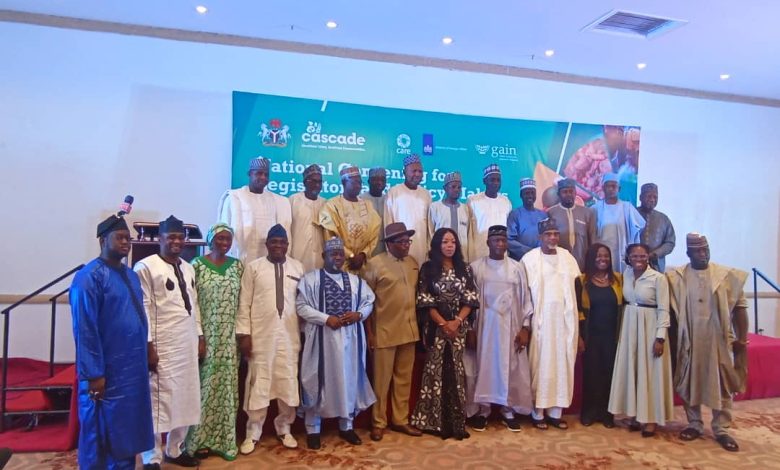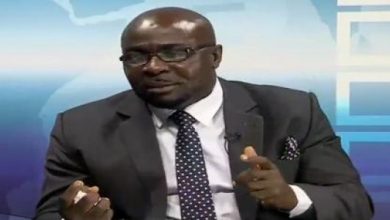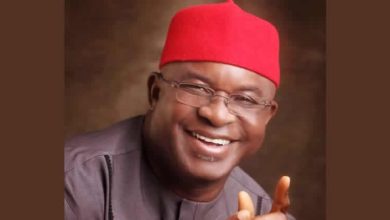Lawmakers, Health Experts Call for Transparency and More Funding to Combat Malnutrition

At a high-level legislative meeting on nutrition on Tuesday in Abuja, stakeholders stated that urgent reforms in policy execution, accountability, and finance are required to reverse the trend of food insecurity and malnutrition in Nigeria, which has reached critical levels.
Nigeria’s present nutrition issue has been referred to as “a ticking time bomb” by Hon. Chike Okafor, the chairman of the House Committee on Nutrition and Food Security. At a nationwide gathering of lawmakers and officials, Okafor gave the keynote presentation and underlined the necessity of a paradigm change in the nation’s approach to food and nutrition policy. The purpose of the meeting is to promote budgetary priorities, policy initiatives, and group pledges to enhance food and nutrition security in the four states of Bauchi, Jigawa, Kebbi, and Nasarawa.
The meeting is a component of the CASCADE Project, which is being carried out in partnership with Care International and the Global Alliance for Improved Nutrition (GAIN) and focuses on the states of Bauchi, Jigawa, Kebbi, and Nasarawa.
“Our efforts, including donor support, have not produced the desired results,” Okafor stated. Food insecurity and hunger are two factors that contribute to widespread poverty and social unrest. We need to approach things differently.
Despite years of treatments, he pointed to a rising trend in maternal anemia, stunting, wasting, and child malnutrition, citing concerning data from the 2023/2024 National Demographic Health Survey (NDHS). The National Multi-sectoral Plan of Action for Food and Nutrition (NMPFAN 2021–2025) has been poorly implemented, according to Okafor, who said that less than 50% of its goals have probably been met.
He bemoaned the apparent discrepancy between effective policy implementation, resource allocation, and accountability, especially at the subnational level.
He proposed the following solutions to solve this: more robust frameworks for monitoring and evaluation that make use of public dashboards and simplified KPIs; community involvement via media and civil society; performance-based rewards for local governments that reach nutrition goals; budget lines specifically allocated to nutrition; and increased parliamentary control over government and donor-funded initiatives.
“We see little accountability from development partners in Nigeria, unlike in other developing countries,” he said, warning against the opaqueness of donor and NGO funding operations in the nutrition sector. Before we are forced to exercise our constitutional authority, we implore them to open their books willingly.
Promotion
“We are committed to not just increasing budgetary allocations but ensuring value for every naira spent,” Okafor said, restating the 10th National Assembly’s pledge to strengthen oversight under Speaker Tajudeen Abbas. All 774 local governments will be subject to multi-level oversight in order to accomplish this.
GAIN’s Country Director, Michael Ojo, underlined the need for more robust legislative backing, saying that “the livelihoods and health of women and children are at risk due to inadequate implementation of many policies.” This project contributes to ensuring that nutrition policies have a real impact.
Building capacity and creating practical nutrition strategies for the participating states were the goals of the meeting, according to Ojo.
Every state will depart with a customized plan of action. To guarantee implementation, both nationally and subnationally, GAIN and CARE will follow up,” he stated.
Additionally, he emphasized that Nigeria must assume responsibility for subsidizing nutrition, saying, “Nutrition is a development issue.” The way we spend our money is just as important as donor funding, particularly in light of the states’ increased federal allocations.
Read Also: Tinubu’s Minister Claims Kwankwaso Is Inactive in Kano, Seeking APC Comeback
The chairman of the Jigawa State House of Assembly’s Appropriations Committee, Hon. Hamza Ibrahim, voiced dissatisfaction about the lack of progress in spite of billions of dollars spent.
He said that the billions spent on nutrition and agriculture were not having the desired effect.
“We’ve allocated N4.1 billion to nutrition this year, N3.7 billion plus N300 million from communities, and N1.3 million from LGAs, but the data doesn’t match our records,” he added, pointing to discrepancies in financial reporting. We’ll go over and balance these numbers.
CARE Nigeria’s Acting Country Director, Jenifer Orgle, greeted attendees and emphasized the critical need to combat malnutrition:
Reaching 1.1 million women and children under five is the goal of the CASCADE project. Prioritizing nutrition funding requires legislative support. We commend the advancements made by Nasarawa and Bauchi and urge Jigawa and Kebbi to put their plans into action.
Clear legislative pledges to speed up nutrition outcomes, encourage healthy diets, and spur quantifiable change across the four focal states are anticipated to be made at the end of the two-day national conversation.





